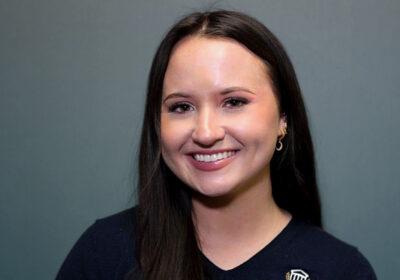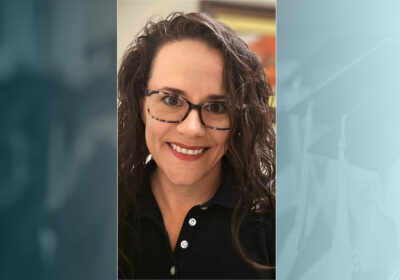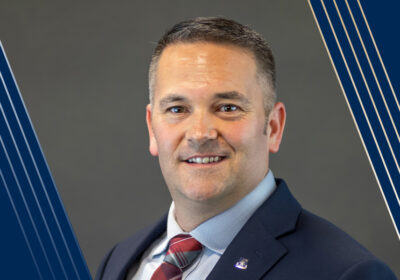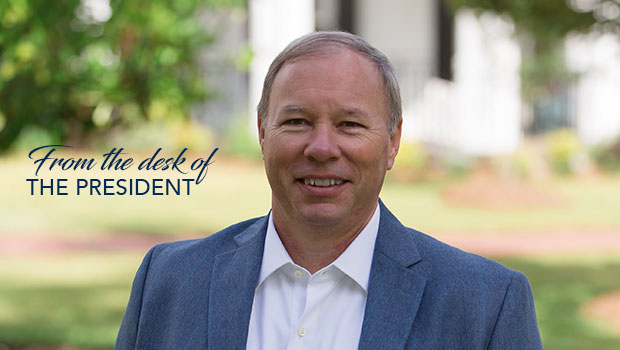In 1990, a young Richard Forbus sat captivated by the screen as his hometown police department, the Las Vegas Metro Police, appeared on the show “COPS.” Despite his parents’ hesitation, Richard had always dreamed of working in law enforcement. And seeing his city’s police department on the big screen was the kickstart he needed to go after his dream career.
Looking to start somewhere, Richard enrolled in a junior college the fall after his high school graduation.
“The experience was not the best,” he said. “I found teachers did not show up for class and I was not as motivated to put the time and effort into my studies. I did take law enforcement classes to become a reserve officer and attended those well. I was also working full-time and had been promoted at the grocery store I worked at, so that took a lot of my focus.”
In the Spring of 1993, Richard was finishing his law enforcement courses where he would pursue a career at a California law agency. However, some words of advice led him down an unexpected path.
“I was going to turn 20 that July; I will never forget,” he said. “Toward the end of the course, the instructor, a Santa Barbara Police Department sergeant named Rick Abney, took me aside and told me that I needed discipline before I entered law enforcement. It was one of those moments where I was a bit upset, but knowing the type of person he was, I took it to heart. The next week, I enlisted in the Marine Corps.”
A Dream Deferred
Richard’s family was no stranger to the Marines, so the decision was easy.
“I am a third generation Marine, with my grandfather serving in WWII, and my uncle serving in Vietnam. My father served in the Navy, and I have other uncles who served in the Army and Air Force.”
Richard began boot camp in September of 1993, graduated that December, and then went to combat training in January. In the late winter of 1994, he was shipped to Texas where he was selected to train in corrections. It was during his training when he developed pneumonia.
“I was then assigned to Camp Pendleton Base Brig in California,” Richard explained. “While there, I had ongoing issues from pneumonia and my symptoms continued to become worse. I developed a lung condition and was given an option of an honorable discharge with a service disability and leaving service early or staying without being able to promote and remaining in a light duty status for the duration of my enlistment.”
Given these options, he decided to leave the service early and was back in the civilian world about 20 months earlier than anticipated.
“I moved to Las Vegas shortly after leaving the Marine Corps and stayed with my grandparents for a brief time until I started working,” he said. “My full intent, as a veteran with military corrections experience, was to work for Las Vegas Metro Police, as I had wanted to since I was a kid. I had just missed the annual testing by a few weeks when I moved to Las Vegas, so I worked casino security and waited for the 1996 test.”
After taking and passing the corrections exam, Richard started the 13-week corrections academy in December of 1996. In the same year, he joined the Las Vegas Metropolitan Police Department.
As time went on and Richard’s family grew, he decided to go back to college to advance in his law enforcement career.
“I went back to college in Fall of 2005,” he said. “I was planning to test for lieutenant in the coming year and wanted to show I was attending college. I also wanted my young kids to see I valued education and wanted them to see my commitment.”
Richard did what he set out to do as he passed his lieutenant exam and earned a bachelor’s degree in public administration. While working with the Las Vegas Metropolitan Police Department, fulfilling his lifelong dream, he accomplished many milestones including earning eight awards with the department.
“I think the awards I am most proud of come from my time as a crisis negotiator with SWAT, where I was awarded three-unit awards, two Medal of Valor awards and a Meritorious Service award for our performance during a couple of hostage incidents we responded to,” he said.
A New Chapter
After 25 years of a successful law enforcement career, Richard made one of the hardest decisions to date—retirement.
“The truth is I was burned out emotionally and physically after a 25-year career in law enforcement,” he said. “When you spend more than half of your life with an organization, separating is much more stressful than I think we want to admit.”
“A few months into retirement, I found myself with an opportunity to consult in jails and prisons to assist with health care delivery. Once hired, I realized I would be working with private and public sector entities, and I wanted to enhance my resume and knowledge of the private sector and health care management.”
Richard had heard about Columbia Southern University back in his law enforcement days through a Learning Partnership.
“My former collective bargaining association, the Police Managers and Supervisors Association, is a CSU Learning Partner,” he said. “I did a bit of contractor work for them prior to hiring with my current job, and I discovered retirees could also participate in the Learning Partner program. CSU’s willingness to work with public safety and the military as a Learning Partner is a highly attractive element of the school, which made my decision easy for me.”
Richard enrolled in January 2022 and graduated with his MBA in health care management in 2024.
“Going back to school for a master’s degree 15 years after finishing my undergraduate degree was a big undertaking,” he said. “I think it was because I picked a degree program in something I was actively working in and learning in my new job went hand-in-hand.”
Currently, Richard is utilizing his degree as the vice president of program development with the National Commission on Correctional Health Care, a non-profit organization that works to improve the delivery of correctional health care in jails, prisons and juvenile facilities.
“In my current role, my primary responsibility is business development,” he said. “I contact correctional leaders and health care administrators in efforts to help them become accredited, to identify needs for consulting services and to provide information on education and certification services.”
Ending a 25-year career and entering a new one is no easy feat. Yet, Richard served his country and his city proudly, and now has found himself in another fulfilling career.
In his most recent accomplishment, Richard walked across the stage at CSU’s 2024 commencement ceremony to receive his diploma; something he was able to do because he took a leap of faith and listened to his heart.
“As someone who received both their undergraduate and master’s at the age of 34 and 51 respectively, I am a testament to the fact it is never too late to achieve your educational goals,” he said. “It is intimidating, of course, to make such a commitment later in your life, and even in your career. However, if your heart is telling you to do it, do it…”
To learn more about becoming a CSU Learning Partner, visit Partnerships | Columbia Southern University.
Disclaimer: These testimonials may not reflect the experience of all CSU students.
Multiple factors, including prior experience, geography, and degree field, affect career outcomes.
CSU does not guarantee a job, promotion, salary increase, eligibility for a position, or other career growth.










